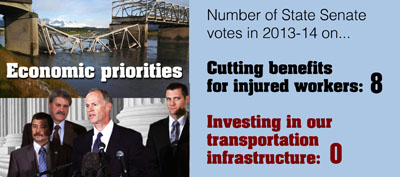NEWS ROUNDUP
Gridlock’s cost, ‘please stop breaking the law,’ who needs you…
Tuesday, October 21, 2014
STATE GOVERNMENT
 ► In the P.S. Business Journal — Study: Invest $7 billion in state transport needs, $42 billion in benefits will come to state — The payback from state transportation investments will yield a sixfold payback: $42 billion in economic benefits from $7 billion invested. That’s a key finding from a study released by the Washington Roundtable, intended to encourage state lawmakers to pass long-delayed transportation funding. The study pinpoints seven of the state’s largest unfunded projects, each of which has specific benefits to the state’s economy. And in every case, failure to fund the projects will erode state businesses’ ability to compete and grow.
► In the P.S. Business Journal — Study: Invest $7 billion in state transport needs, $42 billion in benefits will come to state — The payback from state transportation investments will yield a sixfold payback: $42 billion in economic benefits from $7 billion invested. That’s a key finding from a study released by the Washington Roundtable, intended to encourage state lawmakers to pass long-delayed transportation funding. The study pinpoints seven of the state’s largest unfunded projects, each of which has specific benefits to the state’s economy. And in every case, failure to fund the projects will erode state businesses’ ability to compete and grow.
► In today’s Seattle Times — Puget Sound region’s commute times worsen — Increasing delays are documented in the state’s annual Corridor Capacity Report. For I-5 commuters, annual delay per person increased three hours from 2011 to 2013 — from a total 5 hours, 27 minutes, to 8 hours, 40 minutes.
► In today’s Spokesman-Review — Pilot program aims to monitor, evaluate social service contractors — The Children’s Administration at Washington’s DSHS works with hundreds of contractors throughout the state. All receive the same fees no matter the quality of services they provide. A 2012 law directed the Children’s Administration to shift from fee-for-service payment to performance-based contracting. The Empire Health Foundation is negotiating to launch a pilot program in Spokane to monitor contractors.
► In today’s News Tribune — Federal judge will hear strip club performers’ privacy plea — A court hearing Thursday will pit Washington state’s Public Records Act against the free speech and privacy protections laid out in the U.S. Constitution. U.S. District Court Judge Ronald Leighton could decide whether to allow Pierce County to release the business licenses of workers at a Parkland strip club — an action the employees say would violate their privacy and threaten their ability to continue working.
► In today’s Olympian — Lawmakers get OK for free trips; Pam Roach cleared — An ethics opinion will give state lawmakers more leeway to accept all-expense-paid trips.
LOCAL
► In today’s Seattle Times — Seattle didn’t hold firms accountable on sick-leave rules, report says — During the first 16 months of Seattle’s law requiring businesses to provide paid sick time to workers, the city received 143 employee complaints that it considered worth looking into, according to the Office of the City Auditor. But the city didn’t routinely investigate the employers in question or seek fines. Instead, it mostly sent advisory letters and businesses received zero fines.
► From KPLU — Seattle City Auditor: No more kid gloves for violators of sick leave ordinance — A city department has enforced Seattle’s mandatory sick leave ordinance mainly by sending violators a polite letter. Now the city auditor says it’s time to get tougher.
 ► In the NW Labor Press — Federal judge orders employer to hire seven union painters — In January 2014, Gene Edwards, owner of Edwards Painting in Oregon City, told an NLRB agent he’d shut down the company before he’d go union. But last month, federal administrative law judge John McCarrick ruled the company had violated federal labor law 18 separate ways, ordered it to hire seven union painters, pay back wages with interest, and read the court order in English and Spanish to his assembled employees in the presence of an NLRB agent. Gene Edwards acted as if his company would be immune to the effects of the law. He and his family went into a five-day hearing without an attorney, and made such a mess of the proceedings that the voluminous transcript is full of dark comedy, like when the company denied it was engaged in interstate commerce, or argued that the Painters Union was not a labor organization.
► In the NW Labor Press — Federal judge orders employer to hire seven union painters — In January 2014, Gene Edwards, owner of Edwards Painting in Oregon City, told an NLRB agent he’d shut down the company before he’d go union. But last month, federal administrative law judge John McCarrick ruled the company had violated federal labor law 18 separate ways, ordered it to hire seven union painters, pay back wages with interest, and read the court order in English and Spanish to his assembled employees in the presence of an NLRB agent. Gene Edwards acted as if his company would be immune to the effects of the law. He and his family went into a five-day hearing without an attorney, and made such a mess of the proceedings that the voluminous transcript is full of dark comedy, like when the company denied it was engaged in interstate commerce, or argued that the Painters Union was not a labor organization.
► From AP — EPA: Whatcom’s oil refineries among top polluters in state — Whatcom County’s oil refineries were some of the biggest polluters in Washington state last year, according to the latest data from the U.S. Environmental Protection Agency.
 ► A special project in the Seattle Times — Loaded with lead: Bellevue shooting range poisoned dozens — Manny Romo, a 34-year-old ironworker, was one of 46 people contaminated by lead during renovations at Wade’s Eastside Guns in 2012. He was never warned about lead hazards from spent ammunition at the worksite and unknowingly tracked the poison home to his children. It became the worst known case of occupational lead exposure at an American shooting range, but documented hazards there go back to 2008.
► A special project in the Seattle Times — Loaded with lead: Bellevue shooting range poisoned dozens — Manny Romo, a 34-year-old ironworker, was one of 46 people contaminated by lead during renovations at Wade’s Eastside Guns in 2012. He was never warned about lead hazards from spent ammunition at the worksite and unknowingly tracked the poison home to his children. It became the worst known case of occupational lead exposure at an American shooting range, but documented hazards there go back to 2008.
► In the Seattle Times — Ban lead in ammunition to protect those who frequent gun ranges, and their families (editorial) — Gun enthusiasts and gun-control advocates alike should be able to rally around a simple idea: A job at a gun range shouldn’t make you, and your kids, sick.
► In today’s Columbian — Oregon Iron Works to make 40 to 50 hires for project — Oregon Iron Works, which last week announced that it won a major contract for steel fabrication work on a $1.9 billion transit hub in San Francisco, also said last week that it will employ some 40 to 50 people for the project over a two-year period at the company’s manufacturing plants in Vancouver and in Clackamas, Ore.
► In today’s (Everett) Herald — Romac Industries expands foundry in Sultan — Romac Industries completed a $2.7 million expansion of its foundry in Sultan. The Bothell-based company manufactures pipes for the waterworks industry and sells its products around the world.
BOEING
► In today’s Seattle Times — Boeing revising tanker development schedule — Boeing is revising the planned development schedule for the Air Force’s 767-based KC-46A refueling tanker, though insisting that the tankers will still be delivered on time.
ELECTION
► From KUOW — Some lobbyists play key role in state’s campaign financing — Environmentalists, unions, trial lawyers and business interests may be among the top political spenders in Washington this election year, but there’s a group of influential players who don’t necessarily show up in the campaign finance reports. Lobbyists. They often work behind the scenes to guide campaign contributions on behalf of the interests they work for. It’s another way that lobbyists exert their influence over the political process.
► In today’s Yakima H-R — Former Sen. Slade Gorton launches anti-Didier PAC — Former Republican U.S. Sen. Slade Gorton is leading the effort to expose what the PAC calls Didier’s “weird and extreme views,” and purchased $55,000 in advertisements to spread that message.
 ► At Politico — AFL-CIO President Richard Trumka: Scott Walker on way out — AFL-CIO President Richard Trumka on Tuesday called Wisconsin Gov. Scott Walker the “poster child” for anti-labor policies in the U.S. and predicted he will lose his seat in November.
► At Politico — AFL-CIO President Richard Trumka: Scott Walker on way out — AFL-CIO President Richard Trumka on Tuesday called Wisconsin Gov. Scott Walker the “poster child” for anti-labor policies in the U.S. and predicted he will lose his seat in November.
► In today’s NY Time — In raising immigration, GOP risks backlash after election — Some Republicans are questioning the cost of their focus on immigration. Campaigning on possible threats from undocumented immigrants — similar to claims that President Obama and the Democrats have left the country vulnerable to attacks from Islamic terrorists and the Ebola virus — may backfire after November.
 ► In today’s NY Times — Why Republicans alienate Latinos: They don’t need them — Political analysts keep urging the Republican Party to do more to appeal to Hispanic voters. Yet the party’s congressional leaders show little sign of doing so, blocking an immigration overhaul and harshly criticizing President Obama for his plan to defer deportation for undocumented migrants. There’s a simple reason that congressional Republicans are willing to risk alienating Hispanics: They don’t need their votes, at least not this year. Republicans would probably hold the House — and still have a real chance to retake the Senate — if they lost every single Hispanic voter in the country, according to a new analysis.
► In today’s NY Times — Why Republicans alienate Latinos: They don’t need them — Political analysts keep urging the Republican Party to do more to appeal to Hispanic voters. Yet the party’s congressional leaders show little sign of doing so, blocking an immigration overhaul and harshly criticizing President Obama for his plan to defer deportation for undocumented migrants. There’s a simple reason that congressional Republicans are willing to risk alienating Hispanics: They don’t need their votes, at least not this year. Republicans would probably hold the House — and still have a real chance to retake the Senate — if they lost every single Hispanic voter in the country, according to a new analysis.
TODAY’S MUST-READ
► In the Oregonian — What voters should care about in November (by Laura Terrill Patten and Tom Chamberlain) — From paid sick days and a living wage to equal pay and, ultimately, retirement security, we deserve to know if a candidate who’s asking for our vote will work hard for our families and prioritize the changes it will take to make sure Oregon women and working families have a fair shot at getting ahead, not just getting by.
The Stand posts links to Washington state and national news of interest every weekday morning by 10 a.m.





